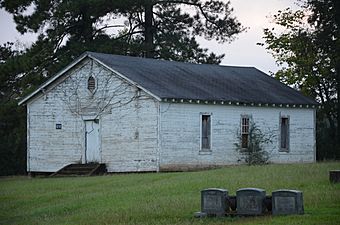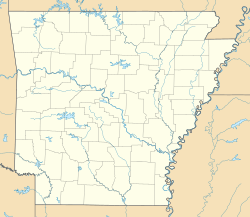Moscow Methodist Church and Cemetery facts for kids
Quick facts for kids |
|
|
Moscow Methodist Church and Cemetery
|
|
 |
|
| Nearest city | Prescott, Arkansas |
|---|---|
| Area | 3 acres (1.2 ha) |
| Built | 1864 |
| Architectural style | Bungalow/craftsman |
| NRHP reference No. | 06000826 |
| Added to NRHP | September 20, 2006 |
The Moscow Methodist Church and Cemetery is a very old and important place. It was built way back in 1864. In 2006, it was added to the National Register of Historic Places, which means it's officially recognized as a special historical site. This church and cemetery are all that's left of a community called Moscow. Moscow used to be near Prescott, Arkansas. It was also close to an old road called the "Moscow-Camden Road" or "Wire Road".
Contents
A Look Back at Moscow's History
The Early Days of Moscow
The community of Moscow started around 1810. It was a small but busy place. People lived on farms and ran small businesses. There were shops, two blacksmiths, a post office, and even a Masonic Lodge. The church congregation, a group of people who met for religious services, began even earlier, around 1842.
The cemetery was used for burials starting in 1864. However, the official paperwork for the land wasn't completed until 1868. This shows that the area was important for both burials and religious meetings before it was officially owned.
Moscow During the Civil War
In 1864, the American Civil War brought fighting to the Moscow area. This was part of a bigger plan called the Red River Campaign and the Camden Expedition. Soldiers from both sides fought battles nearby.
- The Confederate States Army was led by Major General Sterling Price and Brigadier General Thomas Pleasant Dockery.
- The Union Army was led by Major General Frederick Steele and Brigadier General John Milton Thayer.
Several important battles happened around Moscow:
- Fighting at Elkin's Ferry: April 3–4, 1864.
- Skirmish at Prairie D’Ane: April 9–13, 1864.
- Action at Moscow: April 13, 1864.
- Fighting at Poison Spring: April 18, 1864.
How Moscow Changed Over Time
In 1873, a new railroad, the Cairo and Fulton Railroad, was built close to Moscow. A new town, Prescott, grew up right next to the train tracks. Many businesses and people from Moscow moved to Prescott to be closer to the railroad.
As Prescott grew, Moscow became smaller. People from Prescott still used Moscow Cemetery for burials until 1880. After that, a new cemetery called De Ann Cemetery was started. Over time, the community of Moscow slowly disappeared.
Even though the town was gone, the Moscow Methodist Church and Cemetery continued to be used. The church held regular services until 1989. In 2003, the church building and grounds were given to the Moscow Cemetery Association. Today, the church and cemetery are important reminders of the early settlement of Moscow.
People Buried Here
Edward A. Warren
One notable person buried in Moscow Cemetery is Edward A. Warren (1818–1875). He was an important figure in American history. He served as a US Representative, which means he was a member of the United States Congress. He also worked as a Circuit Court Judge.
See also
 | James Van Der Zee |
 | Alma Thomas |
 | Ellis Wilson |
 | Margaret Taylor-Burroughs |



